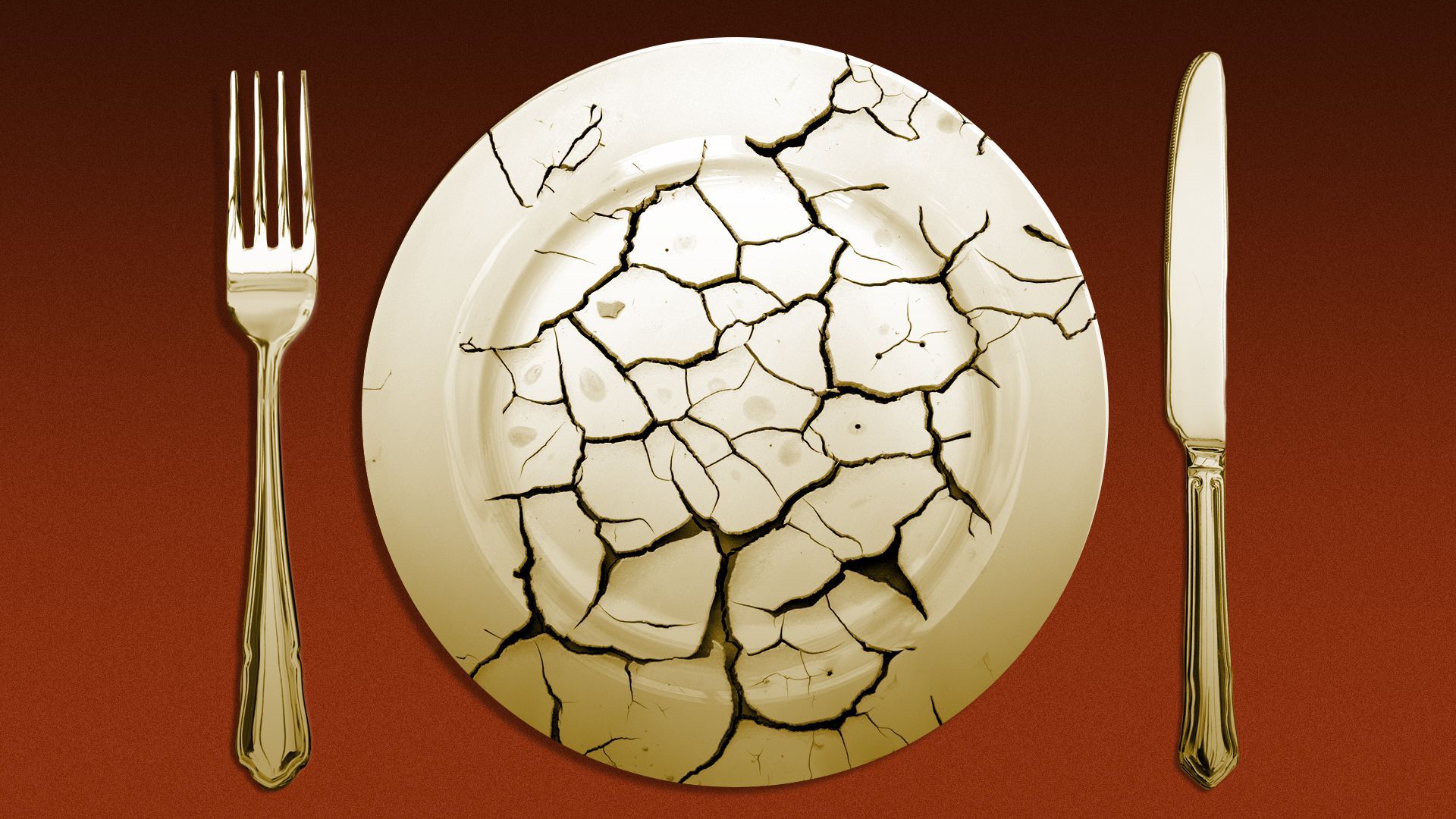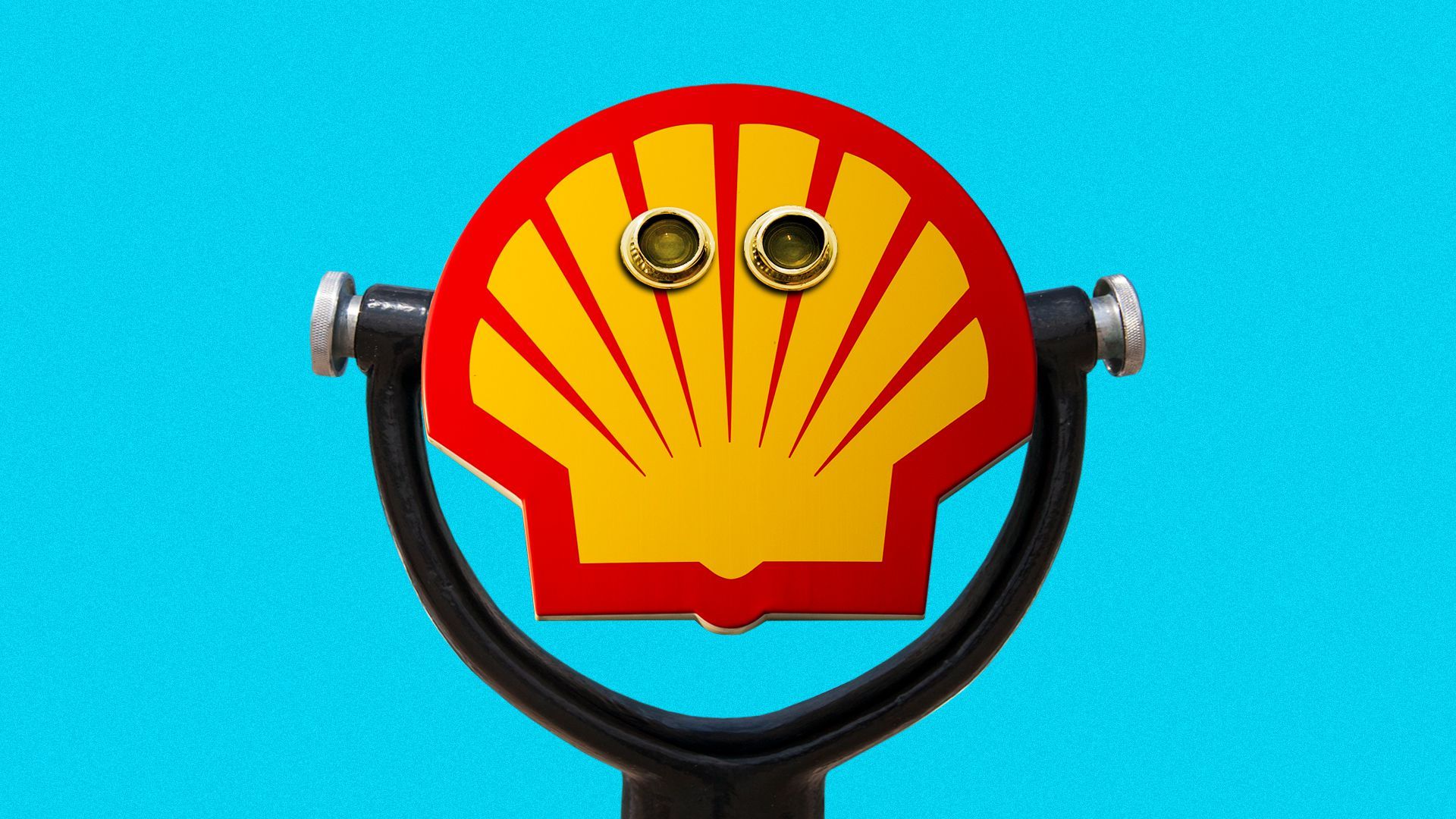| | | | | | | Presented By League of Conservation Voters | | | | Axios Generate | | By Ben Geman and Andrew Freedman · Sep 15, 2022 | | ☕ Good morning! Today's newsletter has a Smart Brevity count of 1,290 words, 5 minutes. 🚨Freight railways and unions reached a tentative deal to prevent a strike that could have snarled fuel and coal transport. Read more 😮 It happened! Ethereum, the 2nd-biggest crypto network, has completed the complicated pivot to a new system that uses vastly less power. Zoom in 🎶 This week marks 40 years since the Pretenders dropped a killer single that's today's intro tune... | | | | | | 1 big thing: Climate change imperils food security in Africa |  | | | Illustration: Shoshana Gordon/Axios | | | | Climate change is "intensifying food insecurity" across sub-Saharan Africa, worsening problems already fueled by the pandemic and Russia's war on Ukraine, per the International Monetary Fund, Ben writes. Driving the news: The fund released a report today that offers trade and fiscal policy ideas for making the region more resilient. - It arrives days after the African Development Bank's chief economist warned that climate change is costing Africa 5%-15% of its per-capita GDP.
The big picture: Sub-Saharan countries are highly vulnerable to droughts and other extremes. - "One-third of the world's droughts occur in sub-Saharan Africa, and Ethiopia and Kenya are enduring one of the worst in at least four decades," a blog post on the findings states.
- Less than 1% of the region's arable land is equipped for irrigation, the IMF said.
- "Countries such as Chad are also being severely impacted by torrential rains and floods," it states, noting a lack of drainage systems, too.
How it works: Climate extremes also raise the cost of food movements — and sometimes thwarts them — in the region's many nations that are highly dependent on imports. Roads, bridges, ports and rail lines can be easily damaged by extreme weather. What they're saying: Examples of the report's recommendations include digitalization efforts that give farmers early warning systems; R&D into more resilient farming methods; and more structural reforms. "Trade liberalization and import diversification could help stabilize regional food supply and prices," the authors' blog post notes. Threat level: The report explores climate impacts occurring alongside the "successive shocks" from COVID and Russia's invasion of Ukraine, which has driven up costs. - This year, 12% of people in the region, or about 123 million, are suffering from high malnutrition and are unable to meet basic food needs.
- Extreme weather, rising temperatures and seas and other changes will "exacerbate" this tally by hindering farming and food movement.
- The problems could threaten the region's gains in health, income and educational outcomes.
|     | | | | | | 2. Shell's taps new CEO amid transition push |  | | | Illustration: Annelise Capossela/Axios | | | | Shell CEO Ben van Beurden will step down at year's end after nine years that included new climate initiatives and weathering the shock of the COVID pandemic, Ben writes. - Wael Sawan, currently head of Shell's integrated gas, renewables and energy solutions unit, will replace van Beurden as CEO.
Why it matters: Shell is among the world's most powerful energy companies. Alongside other European-based giants, it's diversifying into more climate-friendly business lines like EV charging and offshore wind, but also facing criticism that it's moving too slowly. Catch up fast: Van Beurden became CEO in early 2014 and has been with the company for almost 40 years. "The first big move of his tenure as CEO...was the takeover of rival BG Group Plc, a deal valued at close to $50 billion that tested the company's finances during an oil price slump, but is now paying off as natural gas prices soar," Bloomberg notes. What we're watching: Follow This, a climate-focused shareholder advocacy group, offered a mix of praise and criticism of van Beurden as it signaled upcoming pressure campaigns on the new boss. - Oil majors are hauling in huge profits amid high commodity costs, while demand looks set to remain robust for the foreseeable future.
- But Follow This warns that Sawan "has to make bold decisions to explore new business models instead of new oil and gas. If he fails to deliver deep emissions cuts, he puts the company at great financial risk."
Yes, but: Via the Financial Times, RBC Capital Markets analyst Biraj Borkhataria does not expect a major change in the company's posture with van Beurden's departure. "The shift is likely to be more of a continuation than revolution of the strategy put in place by van Beurden," Borkhataria said. Sawan's elevation was "well anticipated," JPMorgan Chase & Co. analyst Christyan Malek said in a note reported by Bloomberg. "We expect him to maintain Shell's pragmatic and holistic approach to the energy transition," Malek said. |     | | | | | | Bonus petro notes: leases and Congress | | ➡️ The Interior Department, acting on a mandate in the new energy law, is providing oil companies $190 million worth of Gulf of Mexico leases. - Catch up fast: They stem from a late 2021 lease sale that a federal judge invalidated. But the law reinstated the leases. High bidders in the sale included Chevron, BP and Exxon.
🔍 Democrats on a House committee released internal oil industry communications they cast as evidence that oil majors' business strategies contradict their climate pledges. |     | | | | | | A message from League of Conservation Voters | | President Biden just delivered a huge climate victory | | |  | | | | Now it's time to move forward with a supercharged transition to clean energy. ConocoPhillips' dirty and dangerous Willow project in America's Arctic threatens to take us backward. President Biden needs to say no to Willow and keep moving us forward. Learn more. | | | | | | 3. Patagonia owner gives company away to fund climate fight |  | | | Illustration: Aïda Amer/Axios | | | | The billionaire founder of Patagonia, the outdoor apparel company, has given away the company in order to finance the fight against climate change, Andrew and Axios' Pete Gannon write. Driving the news: Patagonia announced Wednesday that "effective immediately," Yvon Chouinard and his family have transferred all ownership to two new entities: Patagonia Purpose Trust and the Holdfast Collective. - Each year, the company's profits — less what it reinvests in the business — will be distributed as a dividend "dedicated to fighting the environmental crisis and defending nature," Chouinard wrote in a letter on the company's website.
Between the lines: Billionaires giving away their fortunes is not new. However, the structure of this deal is unique. According to Patagonia, it expects to pay an annual dividend of about $100 million, depending on how the business performs. - The company considered and rejected the idea of a sale or IPO, as none guaranteed that its values could be upheld.
- With the new structure, Chouinard and his family will continue to help guide the new Patagonia Purpose Trust, which owns the voting shares in the company, as well as the Holdfast Collective, which owns 100% of the nonvoting shares.
- They will also continue to sit on Patagonia's board.
- "Truth be told, there were no good options available. So, we created our own," Chouinard wrote.
|     | | | | | | 4. Mapped: America's extreme summer weather of 2022 |  Data: NOAA; Chart: Erin Davis/Axios Visuals It was a relentlessly hot summer in much of the U.S., especially across the Plains, Southwest and West, according to new data from the National Oceanic and Atmospheric Administration, Andrew writes. The big picture: There were two constants: extreme heat in Texas and Oklahoma and damaging flash flooding in multiple locations across the country. - For meteorological summer, which runs from June 1 through Aug. 31, the U.S. average temperature was 2.5°F above average for the season. This made it the third-hottest summer in 128 years, NOAA found.
- Seventeen states in the West, South and Northeast had one of their top 10 warmest summers.
Zoom in: On the July precipitation map, there is a green splotch across eastern Missouri and southern Illinois, and another in large parts of eastern Kentucky. These were the locations of damaging, and deadly, 1,000-year rainfall events. - More of these torrential rainstorms occurred in other locations during August as well.
- Climate change is making extreme rainfall events more likely and more intense.
- The continued drought in the West, though eased somewhat, has led to major wildfires.
Read the whole story. |     | | | | | | 5. Big finance likes big storage |  | | | Illustration: Gabriella Turrisi/Axios | | | | Goldman Sachs and the private equity firm Cleanhill Partners snagged a majority stake in EPC Power, which makes power inverters used in grid-scale battery storage projects, Ben and Axios' Alan Neuhauser write. - Terms were not disclosed.
Why it matters: Goldman Sachs Asset Management's Alexander Mass, in a statement, called EPC the "only scaled supplier of smart inverters that are designed, engineered and 100% manufactured in the U.S." Their products have applications in stationary storage, projects paired with solar, and backup data center power, the firms said today. The intrigue: The deal follows the passage of the climate law that provides new tax incentives for storage. - The law creates "significant financial incentive for adopting EPC Power's inverters and other technologies," the companies said.
- However, the new statute didn't trigger the acquisition, EPC's president tells Alan.
Zoom out: New U.S. grid-scale storage installations grew to a record 2,608-megawatt hours in the second quarter, per new Wood Mackenzie data. |     | | | | | | A message from League of Conservation Voters | | President Biden just delivered a huge climate victory | | |  | | | | Now it's time to move forward with a supercharged transition to clean energy. ConocoPhillips' dirty and dangerous Willow project in America's Arctic threatens to take us backward. President Biden needs to say no to Willow and keep moving us forward. Learn more. | | | | 📬 Did a friend send you this newsletter? Welcome, please sign up. 🙏Thanks to Mickey Meece and David Nather for edits to today's newsletter. H/t to DrRock.com for today's music trivia. We'll see you back here tomorrow! |  | | Why stop here? Let's go Pro. | | | | | | Axios thanks our partners for supporting our newsletters. If you're interested in advertising, learn more here.
Sponsorship has no influence on editorial content. Axios, 3100 Clarendon Blvd, Arlington VA 22201 | | | You received this email because you signed up for newsletters from Axios.
Change your preferences or unsubscribe here. | | | Was this email forwarded to you?
Sign up now to get Axios in your inbox. | | | | Follow Axios on social media:    | | | | | |










No comments:
Post a Comment